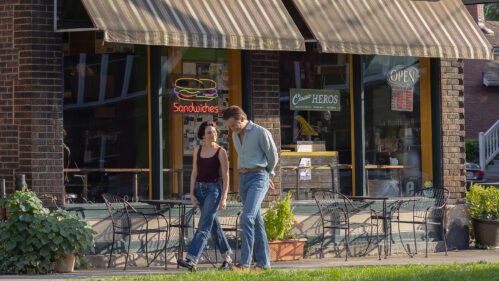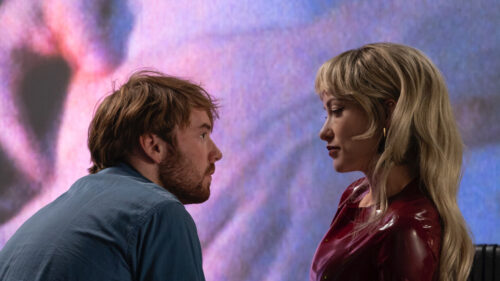CANNES, France — Since my last dispatch I have seen nine films, four of them more than three hours long, bringing my Cannes total to 16 movies in six days. I feel like the hero of “A Clockwork Orange,” who had his eyelids propped open with toothpicks while cinema was force-fed into his brain.
Most of the Cannes films involve adultery, although there have been four weddings, a woman boxer, a vampire, motion sickness and a lot of bluegrass music. Yes, I explain to a correspondent from a dot-com, I always see the movies again back in Chicago before reviewing them. That is not because I want to study them more deeply. It is because I fear confusing them.
For example, “Woman On Top,” starring Spanish actress Penelope Cruz, was about a woman with motion sickness (that explains the title), while the Chinese film “Devils on the Doorstep” created motion sickness with its swooshing hand-held camera shots projected on the giant screen.
I am fairly sure that the bluegrass music is not in Ingmar Bergman‘s screenplay about adultery, but did we actually see the two weddings in “The Golden Bowl,” or were they offscreen? Certainly “Yi Yi” from Taiwan started at a wedding, and “The Wedding” from Russia took place entirely at a wedding. (In my notes on the Russian film, I wrote: “One of danger signals of alcoholism is when you tell someone there is a crate of vodka under your bed.”)
The best two films I have seen in the last three days are “Faithless,” directed by Liv Ullmann from the Bergman screenplay, and “Girlfight,” by Karyn Kusama, which I wrote about Monday. The Ullmann film served as a poignant reminder of what movies were like in the 1970s, when they were as serious about big issues as today’s movies are about little ones. It is a long, deep, lacerating look at adultery, beginning with the observation that not even death can cause as much pain as a divorce. When we consider that Bergman himself was married five times, and that he had a daughter by Ullmann, who did not marry him, we can only assume the screenplay is well-informed.
Erland Josephson plays “Bergman,” a movie director who has apparently hired an actress (Lena Endre) to improvise scenes with him as he writes a screenplay about a woman’s relationships with two men. It is possible that the actress is more, or less, than she seems, and at the end of the film, there is enough ambiguity to make us wonder if, perhaps, she even represents the daughter of the person she portrays. Whatever her exact role, she is played by Endre in a performance so exact and harrowing that she is probably the front-runner for this year’s best actress prize at Cannes.
The weekend was dominated by two big studio films, “The Golden Bowl,” a Henry James adaptation by James Ivory, starring Nick Nolte and Uma Thurman, and “O Brother, Where Art Thou?,” by the Coen Brothers, starring George Clooney and John Turturro. Both have substantial qualities, neither is entirely successful, and I will wait for second viewings before making final opinions.
“The Golden Bowl” got off to a shaky start with giant letters on the screen identifying the Nolte character as “America’s First Billionaire.” Since this information is manifestly unnecessary about a man who lives in one castle, rents another and buys more statues than Citizen Kane, it signals the filmmakers’ lack of faith in the viewer’s intelligence – always an alarming portent.
The James novel, his last, tells of the billionaire (Nolte) and his daughter (Kate Beckinsale), who both marry_she an impecunious Italian prince (Jeremy Northam), he the daughter’s impecunious childhood friend (Thurman). What the viewer knows but the father and daughter do not is that the prince and the friend knew each other (much better than they ought to have) before they married the daughter and her father. James settles this situation without the four characters ever once openly discussing it among themselves, and Ivory’s version is true to that discipline, which sets him a tricky challenge.
The Coens’ film follows three escapees from a Southern chain gang, who jingle about the South still chained to one another, eventually free themselves, and become, among other things, the composers of a bluegrass hit. Clooney, Turturro and Tim Blake Nelson play the leads. Whether the film is a folly, a fancy or simply a conceit, I’m not quite sure. I liked it more than I should have and less than I wanted to.
“Fast Food, Fast Women” is a sub-Woody Allen New York story, written and directed by Amos Kollek, and enormously entertaining in its parts, which never become a whole. It is about lonely people never quite connecting. Louise Lasser gives the performance of her career, as a widow who has to cast a shy widower (Robert Modica) out of his shell; Anna Thompson plays a waitress who falls for a taxi driver but plays him wrong. I liked the movie, but maybe it needed one more run through the rewrite carwash.
As for the films from Taiwan, Russia and China, and “Shadow Of The Vampire,” in which it turns out that Max Shreck, the star of the silent classic “Nosferatu,” really was a vampire . . . I’ll get back to you. Have to rush off to that new Japanese film by Oshima. It’s only 100 minutes long, although his films often feature castrations, which, paradoxically, can add amazingly to their subjective length.











